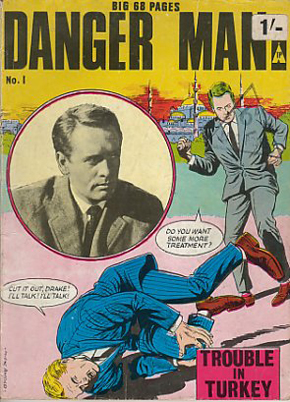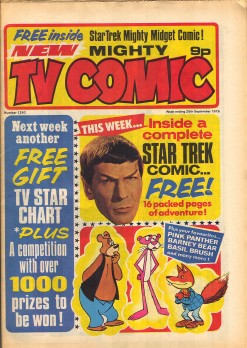
See, in the 1970s my experience with printing and so on was intended to give me more experience when it came to the job I really wanted to do. I wanted to work in publishing as an editor or publisher. I had no intention of getting involved as an artist or writer because I knew that work was never guaranteed but as an editor you had the security.
Thorpe & Porter, IPC -any company that I could get connections to I always dealt with management or bosses and I learnt very early on that there were lots of hand-shakes and cash-under-the-table deals and this was the norm.
Odhams Press. Long established company that went through some tumultuous times. When, in 1968, Odhams encountered "financial problems, partly due to unfavourable economic conditions in Britain" and also as a result of IPC's desire to rationalise its titles and eliminate duplication, the Odhams Press comics were transferred to IPC Magazines Ltd, another IPC subsidiary, after it closed Odhams down. This meant that Odhams, which was a limited company with separate liability, lost the Power Comics range and, in consequence, Odhams became financially unviable.
On the 1st January, 1969. Odhams Press effectively ceased to exist as a publishing business and the coups de grace was delivered when publication of its last surviving comic title, Smash!, was transferred to IPC Magazines Ltd.
The truth, as explained to me by two of IPCs former top men was that Odhams "needed to be put out of business" but why? The explanation was simple. Why publish more than one group of titles if you could put them into another existing group? I've highlighted in the past how everyone from publishers, printers, distributors and wholesalers were in on a very crooked little deal. It's how things worked back then. Cancel a title due to "poor (rigged) sales" and there was a tax kick-back. Merge two titles and there was a scam in that.
The truth is that IPC bosses wanted Odhams out of the way and knew that its money makers were the comics and annuals. Take that from them and they sink. No one at the top levels lossed out so no reason to kick up a stink. That is how it worked.

Something that few people point out because it was all "work for hire", but when one business was sold off to another and then amalgamated and sold off and so on and so forth, they all had separate liability as independent companies and how those "liabilities" were disposed of is still shrouded in a great deal of secrecy and will never be known because even if a sales contract was found it would not tell of the "nod, wink, hand-shake and brown envelope under the desk" (in other words: dirty deals). See, there was no open disclosure back in those days and even into the early 1990s things were still being done that way.
An important thing here is that if a company copyrighted anything it might be the title of a comic. However, you go through a book like Denis Gifford's 1985 Complete Catalogue of British Comics you might find a good few entries confusing because you will find multiples of a specific title and the only way of telling which one you are reading about it the inclusion of a publisher name. I was once told by one of the Fleetway bosses "Just stick 'copyright' on the cover -who is going to question it?" You see "It costs money to go through the rigmarole of copyrighting and these are just comics so why spend unnecessary cash?"
Characters were not copyrighted. Because, obviously, each would cost money and then it gets more awkward when you give the character a new name when you reprint the strip in another title.

Also, the artist/writer was a "work-for-hire" for a specific publication and, legally, though many creators never even thought about it and their work was re-used under one new owner and one title after another -and even exported under lucrative deals for the companies (look up Leo Baxendale v D. C. Thomson or Don Lawrence v Fleetway). In effect, the characters were being used less than legally and the creator should (but they were not even considered back then) have been consulted and paid each time. It means that, today, if you are able to prove you created a certain character you can claim copyright or even request financial reimbursement -up to the 1990s many British characters were (are) still being published in other parts of the world under old licenses.

It is why IPC Media's Chief Executive made it clear to me in correspondence that "IPC Media is not and has not been involved in comic publication for more than thirty years" (that was about 5 years ago).
I could never understand why Quality Communications changed the names of IPC characters when it reprinted the stories in US format, colour comics. The managing editor at Fleetway explained "It was probably a nod and hand shake and money under the table deal". I asked "Well, shouldn't the company be dealing with that?" which got a chuckle and "this is comics and the men upstairs really don't care!"
And there was more I learnt. The warehouse where Fleetway/IPC stored original art was located....well, only a very select few knew. "Not even the editors know where it is. So much art has gone missing over the years that we moved everything and now only a few of us know where its all stored" -the word was never used but "theft" is what was meant. In fact, when laws changed and original art had to be returned to the artist it was found that "missing" art was very selective -the bosses knew who had made the work go "missing" but "who was going to kick up a stink?"
Comics in the UK was about one thing and one thing only. Not about "giving the kids entertainment" or "nurturing creativity" or any of those altruistic things you read about. The sole concern and aim of comics was to make every single penny possible and if a title did not provide the "maximum earning" (even if it was still selling well) it merged, after cancellation, into another title.
I understand the need for a business to be profitable. To make a profit -and British comics were making money. But like Marvel Comics when new owners wanted "more, more, more!" cover prices rose and and if that didn't bring in what they wanted......
I don't think in one of the conversations I had with bosses or editors the thought of entertaining youngsters ever got any consideration. I learnt how to, uh, "cheat" when it came to releasing sales figures as well as all the other dodges. This was not "secret knowledge" but more every day conversation:
"What's on your sandwiches?"
"Cheese and pickle"
"Nice. You diddle that invoice?"
"Yes. First thing"
"Okay"

But, as with US comics there was another major reason why comics hit the skids: fans became employed in companies and they started putting things in comics they wanted. I dealt with this in one of my old CBO (WordPress) postings. The reason comics failed has been given as "the advent of TV" -which in itself is the most preposterous and dumb excuse ever. Comics were still selling well from the advent of TV onward and many stars of TV were featured in comics which boosted sales -The Saint, The Man From U.N.C.L.E., Tarzan, Dr Who, The Avengers, Adam Adamant and so on. TV was helping to push comics sales.

"Oh, the computer age has ruined things!" Can I just write that this is complete and utter bollocks. You give that excise you are a major ass. Did every kid and household in the UK have computers and laptops in the late 1970s to early 1990s? NO.
Wait -surely the Music Hall started killing off comics? No, wait, many Music Hall stars featured in best selling comics.
Ahhh -the cinema. Movies helped kill off comic readership! No, wait, many stars of movies featured in comics that sold very well.
I know -radio. Radio started killing off comics reading, right? Oh, stars of radio were featured in best selling comics? Damn.
I should point out that Laurel and Hardy, Buster Keaton, Arthur Askey, Roy Rogers -in fact, every US and UK theatre, movie, radio and TV star who graced British comics did so without permission. Terry Wakefield noted how his father, George, was the artist of the Laurel and Hardy comic strip and when he heard the duo were on tour in the UK he wanted to go see the characters he'd drawn for so long. NO. Forbidden. Why? Because they might find out they were in British comics and ask for payment!
Why UK comics died is simple. Greed on the part of the owners/publishers and incompetence and stupidity on the part of the fans who got into editing comics. Up until that point it was a job and you had a dinner break you never started conversations about comics -UK or US. Not music hall, not radio, not the movies, not TV -these did not kill off comics in the UK. It was the people who thought "I'll keep at this until the job goes then move on to something else" -it was greed and self interest.

Ask why countries with smaller populations but with radio, movies and the internet have comic publishing still? I look at allof this here:
http://hoopercomicart.blogspot.co.uk/2015/05/why-are-uk-business-entrepreneurs-not.html
What I find beneath contempt, the little turd you accidentally step-in because you never saw it, are those cap-doffing, forelock pulling "the bosses know best" people who claim to be part of "the comics industry" (that does not exist) and will do everything to undermine every effort to help get it going again. They start trolling or creating arguments because they have such small minds and so little work that it's all they can do. They want to be the "nice guys of comics" -the egoes burst out of their under developed craniums.
Yes, the UK comics people from what was the very top to the bottom of the rung worn out artists are the people to blame. People who have looked at these things know that. Some will point the odd one or two things out but never point fingers because they are scared of the backlash from the trolling 'nice guys'.
Fuck the trolling 'nice guys'. They are like that shit on your shoes -wipe them away without a second thought because they are insignificant. They mean nothing to comics.
The only way you will get successful comics in the UK is to ignore the "names" (usually in their own minds) and publish comics as a business but to entertain. And for that you will need to business entrepreneurs and their know-how and someone who knows business and more importantly comics.
Yeah. Me.
Did I just hear blood vessels popping?


No comments:
Post a Comment